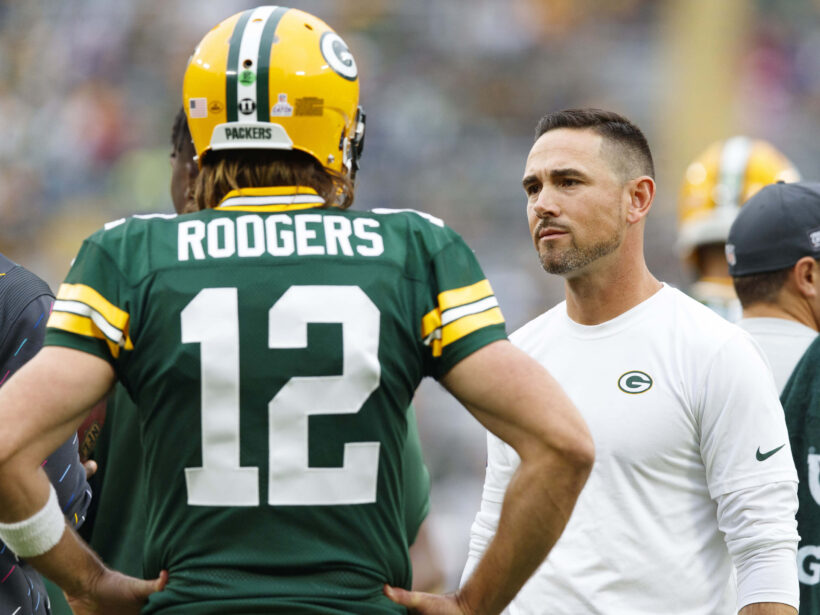Mini camp is officially underway for the Green Bay Packers, and with that we’ve witnessed the return of Aaron Rodgers to 1265 Lombardi Avenue. Naturally, it’s time to start picking apart his football abilities and apparently asking “should he be throwing more interceptions?” Now, you may be normal, and that fact would likely lead you to wonder what someone could possibly mean when asking if Rodgers should take more “risky throws” than he already does.
Hear me out, there seems to be a subset of Packers fans, as well as other groups of people — including a few media pundits —who legitimately believe Aaron Rodgers doesn’t take nearly enough risks. If you often make the mistake of viewing countless people’s opinions on the internet, you may have actually heard of this talking point. People seem to think that the Packers would benefit greatly if Rodgers threw a few more touchdowns at the cost of a few more interceptions. I’ll get into my thoughts on this shortly, but I’ll preface by saying: no, Aaron Rodgers doesn’t need to throw more interceptions.
I get it. “You’re taking the argument in bad faith, the answer wouldn’t literally just be throwing more interceptions, blah blah blah.” Sure, but it’s more fun to frame it that way, and the argument is nearly that absurd anyway. You’ll often see responses of this nature on any graphic or post that highlights Aaron Rodgers’ touchdown to interception ratio, or any list that shows the many QBs that have thrown more interceptions than Rodgers. There will often be rhetoric that implies the quarterback’s famous lack of interceptions is actually working against him, as it is his way of “stat padding” and “not taking the risks necessary to win.”
How to Analyze This Concept:
It is obviously not reasonable to say “see, the Packers actually lose games when Aaron Rodgers throws a bunch of interceptions!” This argument doesn’t work for a few reasons, one reason is… interceptions are bad, this is abundantly clear. It’s also clear that all quarterbacks naturally take more risks, and in turn throw more interceptions, if they are down big in a game. So, “throwing interceptions is closely correlated with losing games” doesn’t work refute this narrative.
Clearly the best way to refute the “Aaron Rodgers is too risk-averse” argument is to show clip after clip of him making off balance, tight window, and definitely risky throws. I, however, am not going to do that here. I feel as though it’s sufficient to say that if you think Rodgers constantly shies away from taking risks, you’re buying into a narrative that has floated around since 2015 and you probably haven’t watched him play very much.
It is true that Aaron Rodgers has thrown many incredible passes on free plays, which inherently are not risky. Free plays aren’t the only time he’s made impressive throws though. You don’t typically win 13 games in a season (especially not three times in a row) without a quarterback who takes a calculated number of risks. You definitely don’t win the MVP award in back to back years without making impressive and risky throws. So where is this narrative spawning from?
When is it Best to Take Risks? Past and Present
In the days of Brett Favre, the Packers won as many championships as they have under Rodgers: just one. This is the case despite the fact that Favre was one of the bravest gunslingers with the ball that the NFL has ever witnessed. Back breaking interceptions were the culprit for many of Favre’s playoff losses, in fact. We all know that throwing interceptions is just about the worst thing a quarterback can do, I don’t need to defend that. There is, however, merit to the idea that an NFL quarterback needs to be comfortable taking risks to win games.
There is a belief that the Packers’ recent shortcomings in the playoffs falls squarely on the quarterback, and subsequently, his “lack of risk taking.” Observing the Packers recent playoff loss to the 49ers, we see that a share of blame falls on special teams. However, if we want to look at Aaron Rodgers’ role in the loss, it is clear that he actually should have avoided a certain risk. We’ve all seen the play on the final drive where Rodgers threw deep down the sideline to Davante Adams, who was double covered. A win was far more in reach if Aaron Rodgers actually took the safer route, throwing to Lazard or taking a checkdown. Sometimes taking a risk isn’t worth it, and I’d posit that Rodgers can be trusted to identify these situations.
Conclusion
One last thing to consider is that teams have capitalized with touchdowns on each of Aaron Rodgers’ last five playoff interceptions, dating back to the divisional round win over Dallas following the 2016 season. It is fair to be slightly risk-averse in the playoffs if teams seem to always capitalize on your rare turnovers. If a high risk throw can essentially yield a -14 point differential, it‘s usually best to avoid it.
I wanted to take some time yell into the void about this issue, but I hope that if I’ve reinforced one idea it’s that turnovers… are bad. In fact, turnovers can often be even more harmful than touchdowns are helpful. The Packers would not magically be in a better position if Aaron Rodgers took many more risks than he already does, and it just feels misguided to paint this as some major issue for the Packers quarterback.
——————
Zack is a college student and cheesehead from California. When he’s not in class or writing, you can find him talking about the Packers on Twitter at @Zack_Upchurch.
——————

